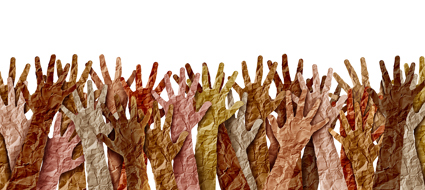A new briefing offers an overview of how anti-racist systems leadership could and should eradicate inequalities. To support International Day for the Elimination of Racial Discrimination the resource is open access.
Tackling the roots of racism is challenging and complex. A new Strategic Briefing on anti-racist systems leadership to address systemic racism aims to support leaders in understanding how racism is constructed and perpetuated in policies, tools and practice.
It signposts to research and resources, and shows the multi-layered impact of racism in communities, workforces, and public systems. Readers can also use case study examples and tools to establish themselves with anti-racist systems leaders.
Released on International Day for the Elimination of Racial Discrimination (21 March) and 75 years after the implementation of the Universal Declaration of Human Rights the learning resource supports this year’s theme focusing on the urgency of combatting racism and racial discrimination (#FightRacism).
‘Without understanding how our systems have been built, we cannot fully comprehend how systems leaders must tackle racism, oppression, and discrimination. The reality today is that structural, systemic racism continues to significantly impact human lives. Multiple sources of evidence of outcomes show disproportionality and differential treatment of Global Majority children and adults by the systems which should support them.’
The briefing focuses on racism experienced by Global Majority* communities and workforces because this is where the voice of the author, the research and other evidence offers a strong direction to inform anti-racist systems leadership. The principles, actions and tools enable transferable learning to address discrimination experienced by other groups.
*In this briefing the term ‘Global Majority’ is used. This term includes those people who identify as Black, African, Asian, Brown, Arab and mixed heritage, are indigenous to the global south, and/or have been racialised as ‘ethnic minorities’. Globally, these groups currently represent approximately 85% of the world’s population (Campbell-Stephens, 2021, p. 7).
Where other terminology is used (for example ‘Black or minority ethnic’) this refers to the language used in the research or reports being cited. The term minoritised recognises that people are actively minoritised by others rather than ‘naturally’ or factually existing as a minority (see Gunaratnum, 2003 in Milner & Jumbe, 2020).
Research in Practice capitalises the B in Black to acknowledge a shared historical and cultural identity but does not capitalise white due to associations with white supremacy. See key concepts and terminology underpinning this briefing.




